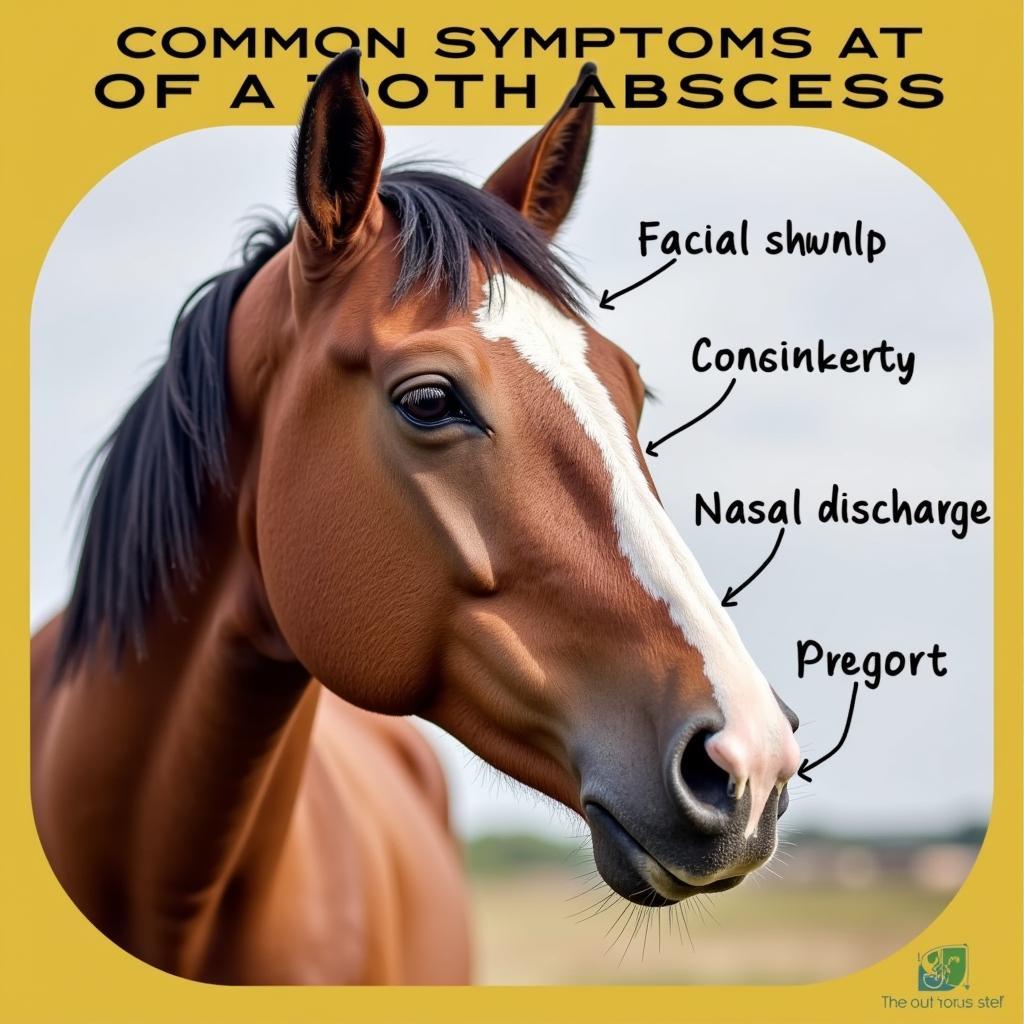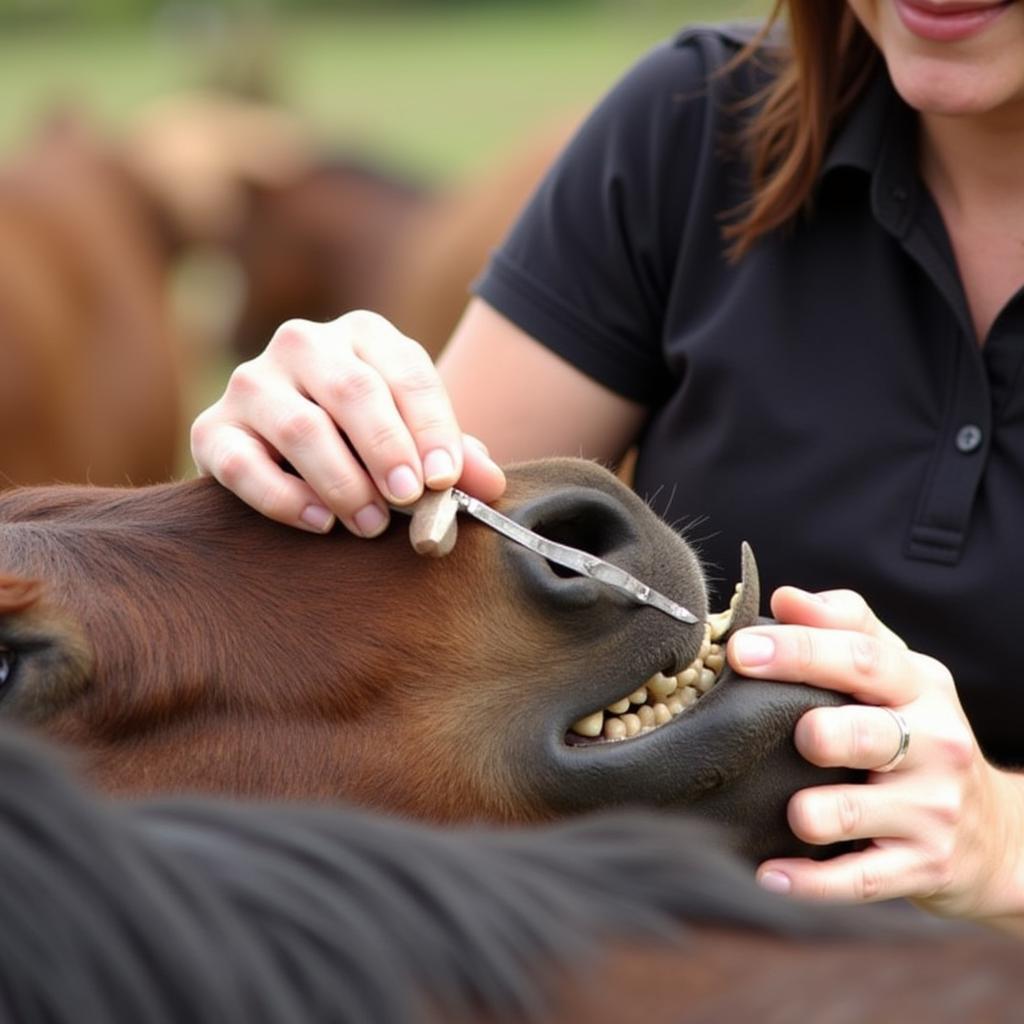A tooth abscess in horses is a painful condition caused by a bacterial infection that forms a pocket of pus within a tooth or its surrounding tissues. This can be a serious health concern for horses, impacting their ability to eat, drink, and behave normally.
 Horse Tooth Abscess Symptoms
Horse Tooth Abscess Symptoms
Understanding Tooth Abscesses in Horses
Horses’ teeth are constantly growing, and over time, various factors can lead to dental problems like tooth abscesses. The most common cause is an infection that originates from a fractured tooth, periodontal disease, or damage to the gums. When bacteria enter the tooth or surrounding tissues, the body’s immune system responds, leading to inflammation and pus formation.
Identifying the Signs of a Tooth Abscess
Recognizing the signs of a tooth abscess early is crucial for timely intervention and effective treatment. Here are some common symptoms to watch out for in your horse:
- Facial Swelling: One of the most noticeable signs is swelling on the side of the face where the affected tooth is located.
- Nasal Discharge: A foul-smelling discharge from one nostril can indicate drainage from an abscessed tooth.
- Difficulty Chewing: Horses with tooth abscesses may have difficulty chewing their food, often dropping food from their mouths or showing signs of pain while eating.
- Head Shaking or Tilting: Discomfort from the abscess can cause horses to shake their heads or hold their heads in an unusual position.
- Reluctance to be Touched: The area around the abscess is typically painful, and horses may resist being touched on the face or head.
Diagnosing and Treating Tooth Abscesses
If you suspect your horse has a tooth abscess, it’s crucial to contact your veterinarian immediately. They will perform a thorough examination, including a physical exam and often dental X-rays, to determine the location and severity of the abscess.
Treatment for a tooth abscess typically involves:
- Draining the Abscess: The veterinarian will create an opening to allow the pus to drain, relieving pressure and promoting healing.
- Antibiotics: Antibiotics are prescribed to combat the bacterial infection and prevent its spread.
- Flushing: The abscessed area will need to be flushed regularly with an antiseptic solution to keep it clean and facilitate healing.
- Pain Relief: Pain management is an essential part of treatment, and your veterinarian may recommend non-steroidal anti-inflammatory drugs (NSAIDs) to alleviate discomfort.
Preventing Tooth Abscesses in Horses
While not all tooth abscesses are preventable, there are steps you can take to minimize the risk for your horse:
- Regular Dental Checkups: Schedule annual dental examinations with an equine veterinarian experienced in dentistry. They can identify and address dental problems early on, reducing the likelihood of abscesses developing.
- Provide a Tooth-Friendly Diet: Offer your horse a diet that promotes good dental health. Avoid feeding excessive amounts of sugary treats or grains, which can contribute to tooth decay.
- Monitor Your Horse’s Teeth: Be attentive to any changes in your horse’s eating habits, behavior, or facial features. Early detection is key to successful treatment.
 Horse Tooth Abscess Prevention
Horse Tooth Abscess Prevention
Conclusion
Tooth abscesses in horses are painful infections that require prompt veterinary attention. By understanding the causes, symptoms, and treatment options, you can play a proactive role in protecting your equine companion’s dental health and overall well-being. Regular dental care, a balanced diet, and vigilant observation are essential for preventing tooth abscesses and ensuring your horse lives a long, healthy, and pain-free life.
FAQs
1. Can a horse recover fully from a tooth abscess?
Yes, with prompt and appropriate treatment, most horses can recover fully from tooth abscesses.
2. How long does it take for a horse’s tooth abscess to heal?
Healing time varies depending on the severity of the abscess, but it typically takes several weeks to a few months.
3. Can I prevent tooth abscesses in my horse?
While not all abscesses are preventable, regular dental care, a proper diet, and early detection of dental issues can significantly reduce the risk.
4. Is a tooth abscess in a horse considered an emergency?
Yes, a tooth abscess is a painful condition that requires immediate veterinary attention.
5. What should I feed my horse if they have a tooth abscess?
Soft, easily chewable foods such as soaked hay cubes, mashes, and senior feeds are recommended for horses with dental issues.
For more information on equine health topics, explore our other articles on tooth root abscess horse and horse mouth foaming.
If you need assistance or have any concerns about your horse’s health, please don’t hesitate to contact us at Phone Number: 0772127271, Email: [email protected] or visit our address: QGM2+WX2, Vị Trung, Vị Thuỷ, Hậu Giang, Việt Nam. Our dedicated customer care team is available 24/7 to assist you.